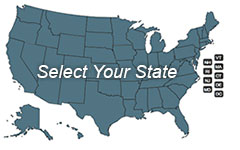Mental Health Counselor Licensure in California
California mental health counselors are credentialed as Licensed Professional Clinical Counselors (LPCC) by the California Board of Behavioral Sciences. While meeting practice requirements, they hold Professional Clinical Counselor Intern (PCCI) registration.

Select a California Mental Health Counselor Licensure Topic:
- Licensed Professional Counselor Education Requirements
- Required Examination
- Supervision Requirements
- Application Process
- Out-of-State Counselors
- Marriage and Family Therapy Specialization
- Contacts and Additional Information
Education: General Requirements
The minimum educational level is the master’s degree. Students who begin after August 1, 2012 are to have the equivalent of three semester hours in each of the following:
- Theories and techniques of psychotherapy and counseling
- Group counseling
- Career development
- Human growth and development
- Individual assessment, appraisal, and testing
- Principles of diagnosis
- Multicultural counseling
- Psychopharmacolgy
- Research and evaluation
- Ethics, law, and professional orientation
- Advanced theories and techniques of psychotherapy and counseling
- Addiction counseling
- Trauma or crisis counseling
Up to three of the above courses can be taken post-degree.
The student will have at least six semester hours of fieldwork and at least 15 semester hours of coursework that develops knowledge of special populations or treatment methodologies. The total program will be at least 60 semester hours
The program must also include California-specific content, including coverage of cultural groups within the state. The California Association of Licensed Professional Clinical Counselors notes that curricular expectations apply to all students who complete requirements while living in California, whether the coursework is taken online or at a traditional institution (http://calpcc.org/requirements-after-2012). Students should consult the list of Board-approved programs.
Students Who Began Programs Before August 2012
Requirements are lower for candidates who began programs before August 2012. They may be licensed on the basis of 48-semester hour graduate degrees. They must have education in nine core areas prior to licensure.
- Human growth and development
- Therapies and techniques of psychotherapy and counseling
- Principles of diagnosis
- Individual assessment, appraisal, and testing
- Multicultural counseling
- Group counseling
- Career development
- Research and evaluation
- Professional orientation/counseling ethics and law
A full description of required content areas is found on the BBC website (https://www.bbs.ca.gov/applicants/). Candidates are allowed to make up some deficiencies in didactic coursework post-master; out-of-state candidates are allowed more leniency.
The program must include six semester hours of internship. The student will have at least 150 hours of clinical counseling experience.
The candidate will need seven contact hours of child abuse training, ten hours each of human sexuality and aging/ long-term care, fifteen hours each of alcoholism/ chemical dependency, spousal and partner abuse, and crisis/ trauma counseling, as well as eighteen hours of law and ethics. These courses may be taken through an academic institution or through a government agency or approved continuing education vendor. Additionally, the candidate will need two semester hours of psychopharmacology. This may be satisfied through a university course at the graduate or undergraduate level.
Supervised Practice
An individual must accrue 3,000 hours of post-degree supervised experience before full licensure can be granted. The supervised work period will last a minimum of two years. The Board will not credit hours accrued more than six years in the past. While accruing hours, an in-state intern will be registered as a PCCI. Candidates who apply for intern registration within the first 90 days after earning the degree are granted a grace period; they can begin accruing hours before their registration is issued.
Experience must meet standards set by the California Board. At least 1,750 hours must be spent performing psychotherapy with individuals and groups; no more than 500 can be credited for group therapy or counseling. At least 150 clinical experience hours must be accrued in a community health setting or hospital. No more than 250 hours can be credited for telehealth counseling. Up to 1,250 hours may be credited for non-counseling tasks such as administering and evaluating assessments, writing reports, advocating for clients, and attending workshops.
The amount of supervision required in a given week will depend on the number of work settings in which experience was accrued and the number of hours spent performing psychotherapy face-to-face at each location. Clinical supervisors do not necessarily have to be licensed as counselors, but they do need to be licensed as mental health professionals. Doctors may be licensed as psychologists or licensed as physicians and certified in psychology. Whatever their credentialing, supervisors must have held licenses for a minimum of two years and have performed psychotherapy (or supervised those who performed psychotherapy) during at least two of the preceding five years. Supervision may be provided by an off-site professional, except in cases where it takes place in a private practice setting.
Interns must be W-2 employees unless they are volunteering. The BBS has put together a list of frequently asked questions for interns (http://www.bbs.ca.gov/pdf/publications/pcci_faq.pdf).
The Examination Process
After accruing the required 3,000 hours, the candidate must pass a series of two examinations. The first is the California Law and Ethics Examination. This is administered by PSI. Candidates who have been notified by the Board of eligibility will visit PSI on the web (www.psiexams.com) or call (877) 392-6422 to schedule their examination. The automated phone system is available 24 hours a day. A candidate handbook is available for download from the BBS site. It includes in-state and out-of-state testing centers as well as a breakdown of examination content. A candidate who fails an attempt will need to apply for re-examination. The exam must be retaken within a year. The Board will allow four attempts during a one-year period.
A successful candidate will then take the National Clinical Mental Health Counselor Examination (NCMHCE), administered by the National Board for Certified Counselors (NBCC). After receiving approval from the Board of Behavioral Sciences, the candidate can register and pays fees. Once the NBCC confirms eligibility, the candidate will be allowed to schedule an examination. NBCC examinations are available two weeks out of each month in seventeen California cities and at testing centers around the nation (http://www.nbcc.org/directory/CA). Results will be available four weeks after the close of the testing week. A candidate who fails an NCMHCE examination will need to wait three months before retesting.
The Application Process
In-state candidates apply first at the intern level. Education is documented at this time. $100 is paid to the Board.
Interns will submit exam applications after they have met supervision requirements. They will submit supervisor verification as well as all W-2 forms that they were issued during their intern years. A total of $280 is due at this time.
Initial applicants must complete a fingerprint-based background check. In-state candidates may opt to have their prints made electronically through LiveScan. LiveScan sites are available throughout the state; candidates may access a list of locations, operating hours, and fees online (https://oag.ca.gov/fingerprints/locations).
Out-of-state candidates will need to use traditional inked cards. They will initiate the process by emailing the Board webmaster (http://www.bbs.ca.gov/app-reg/fingerprints.shtml). The cards will be mailed, and the candidate will have prints made at a law enforcement office located in the state of residency. Applicants opting for traditional cards are advised that the California Department of Justice will take at least eight to twelve weeks to process ‘hard cards’.
Application forms are available on the BBS website (https://www.bbs.ca.gov/applicants/).
Out-of-State Counselors
The California Association of Licensed Professional Clinical Counselors notes that out-of-state counselors can be licensed on the basis of 48-semester hour degrees through 2015. Some state-specific concepts are to be completed through continuing education (http://calpcc.org/out-of-state-applicants).
An out-of-state counselor who has been licensed less than two years will need to accrue 250 hours under intern registration even if the 3,000 hour supervised experience had been met. If the 3,000 hour requirement has not yet been met, these 250 hours may also be credited toward the 3,000 total hours.
Marriage and Family Therapy
Treatment of marital and family units in not included in the scope of practice unless the counselor has completed additional training. Marriage and family therapy may be a named specialization or may be represented by six semester hours of coursework (http://www.bbs.ca.gov/pdf/publications/lawsregs.pdf).
Additional Information
California has been licensing mental health counselors for a relatively short time period. The Board of Behavioral Sciences (http://www.bbs.ca.gov/lpcc_program/) has directed applicants to the California Association of Licensed Professional Clinical Counselors (http://calpcc.org/) to find answers to their questions.
Find Mental Health Counselor Licensure Requirements in Your State:

Learn about becoming a Mental Health Counselor in your state:
To View Full U.S. Map Click Here.












